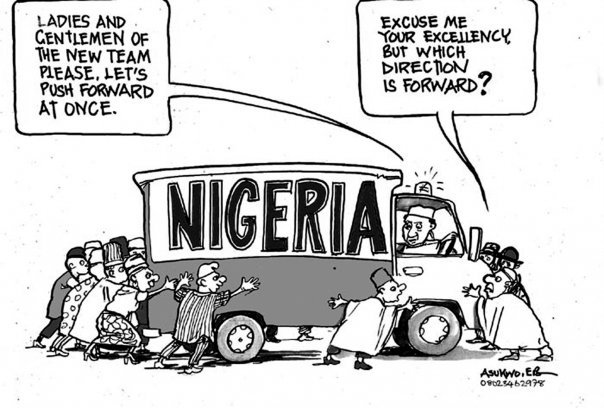
This is a political cartoon by Nigerian cartoonist Mike Asukwo who works for the Nigerian newspaper “Business Daily.” Depicted is a stationary truck labeled in large letters “NIGERIA” with a turned on emergency vehicle light on top. Driving the truck is a Nigerian leader who is calling out the window, “Ladies and gentlemen of the new team please, let’s push forward at once.” Collected around the front and back of the car are Nigerians pushing the stuck vehicle toward each other in opposite directions. A man at the front of the truck pushing it backwards asks, “Excuse me your excellency, but which direction is forward?” Both the leader driving the truck and people pushing it display frustrated looks as the “NIGERIA” vehicle stays in place.
Based on the driver’s statement of “new team,” it can be inferred that the people pushing the truck are there for the leader’s aid, or are his cabinet members, and are new to the job. Asukwo illustrates the leader’s comrades’ confusion, disorganization, and lack of coordination by picturing them having trouble understanding and figuring out a simple task such as pushing a truck. The large truck itself represents the newly independent country of Nigeria and the power and force it could contain once it is fixed and moving, despite it’s currently stagnant position. The added emergency light suggests that the truck representing Nigeria is in a state of trouble and emergency, and must therefore be repaired quickly. The two opposite directions the people are pushing the vehicle illustrate the dilemma in Nigeria. Some believe they should push the truck backward to get it moving, or return to aspects and political methods of pre colonial Nigeria to allow the country to stabilize. However, others believe in pushing the truck forward, or constructing a country free from it’s past with new leadership and structure. The person addressing the truck driver as “your excellency” adds the notion that the those surrounding the truck are not equal or of lesser importance than that of the man driving it. The humorously drawn characters and the conversational air of the cartoon give it the purpose as one meaning to educate Nigerians and the international community on the situation the government faces. It is also to lighten the atmosphere regarding the stressed and rushed process of developing Nigeria into a stable, autonomous country. As stated by Asukwo himself, he wishes his cartoons might inspire change, but also to “help lighten the mood” regarding Nigeria’s advancement, thus giving them a lighthearted and humorous tone.
South Africa:
This is a political cartoon by South African cartoonist Dov Fedler who works for the South African newspaper “The Star.” Published on March 8th, 1988, the cartoon depicts a white man sitting on a garbage can labeled “white trash only.” He is pointing at a black man on a ladder across from him who is hammering a sign on a wall reading “Whites Only (By Order Boksburg).” The white man is telling him “Ok Philemon, as soon as you’ve got that up, get the hell out of here.” The black man is looking over his shoulder at the white man with a sheepish expression.
This cartoon is highlighting the hypocritical concept of petty apartheid that was implemented in South Africa, specifically the city of Boksburg, in 1988. The white man represents the privileged white population and is possibly a member of the newly appointed Conservative Party in Boksburg, and the black man represents the black citizens and workers that were not allowed in many public spaces at the time. The white man’s scruffy appearance further exemplifies the black man’s status in South Africa at the time- even the least important white man was more respected than a black man. The cartoon’s message conveys that even though whites wanted to live in segregated areas without blacks near them, they still needed them to work the small jobs and install the very signs enforcing this concept. Fedler thus displays a humorous and hypocritical tone through the cartoon’s caricatures and speech. When asked about his illustration’s influence, Fedler responded, “People aren’t going to change their political views because of a cartoon.” Thus, the cartoon’s lack of specific facts and important figures suggests that it was meant to simply bring light to the effects of apartheid in South Africa for viewers of all status’ in South Africa and the international community.


